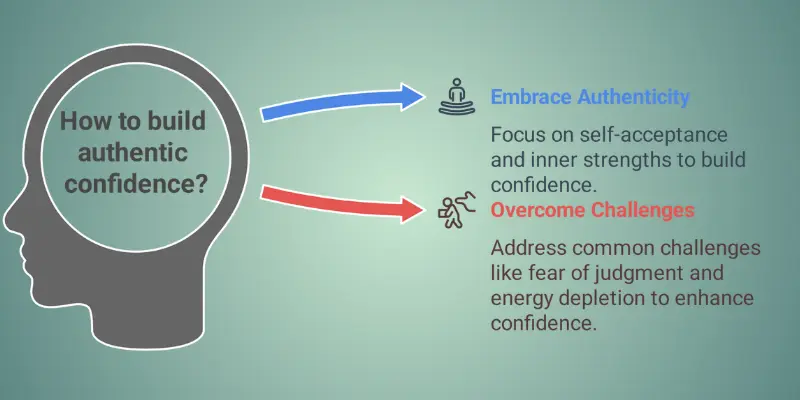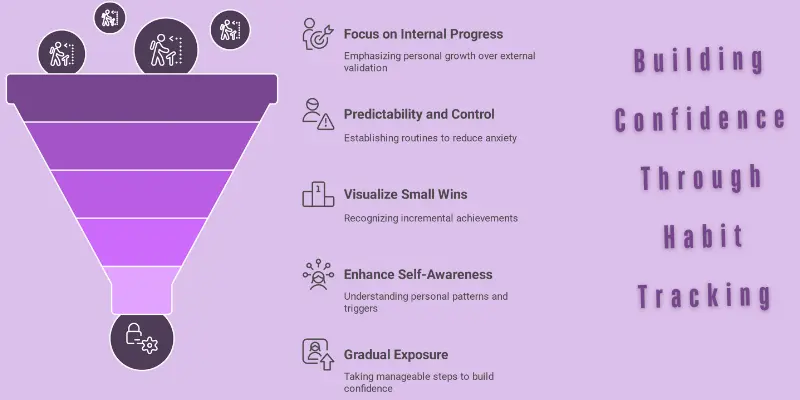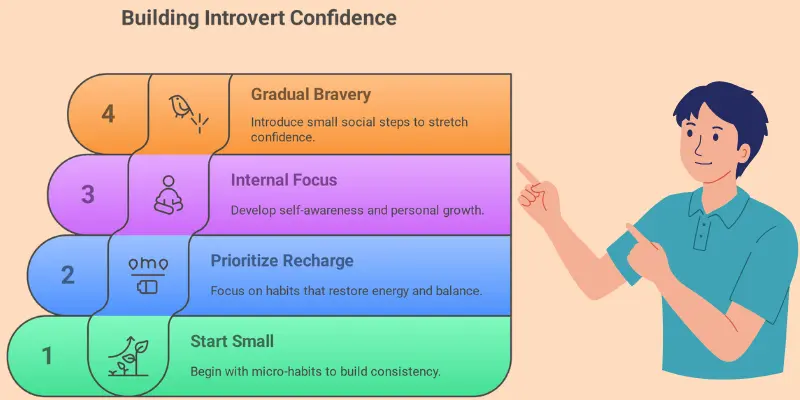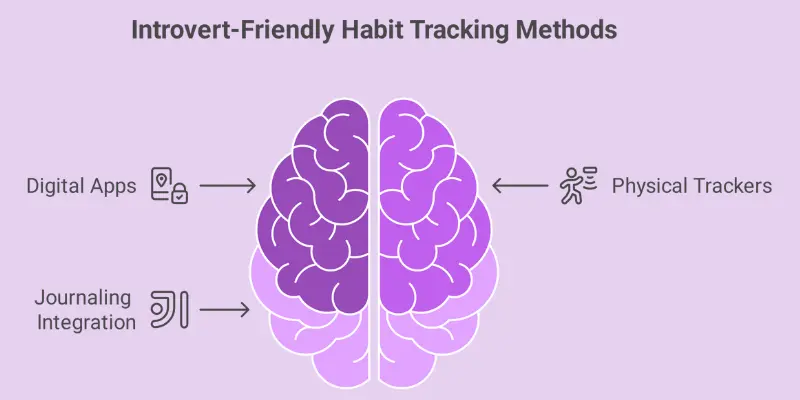Unlock Your Quiet Power: Habit Tracking for Introverts to Build Authentic Confidence
Published: 29/06/2025
Do you often find yourself holding back, even when you have brilliant ideas to share? Does the thought of stepping into the spotlight feel more draining than empowering? As an introvert, it can sometimes feel like the world expects you to speak up and stand out in ways that don’t align with who you are. The constant push to “be more outgoing” or “speak up more” can leave you feeling misunderstood and frustrated.
Traditional confidence advice often misses the mark for introverts. Being encouraged to act more extroverted, to push through discomfort in social situations, or to make small talk when it feels unnatural, can feel like forcing a square peg into a round hole. It’s not that you don’t want to build confidence—it’s that the methods simply don’t suit your needs.
This is where habit tracking comes in. It offers a quieter, more personalized way to build confidence that honors your unique strengths. Habit tracking for introverts isn’t about pushing beyond your limits in ways that feel uncomfortable. Instead, it’s about embracing your natural pace, focusing on small wins, and tracking your progress in a way that feels authentic to you. It allows you to gradually build the confidence you deserve without changing who you are.
In this guide, you’ll learn how habit tracking can help you build authentic confidence on your terms. We’ll explore actionable strategies and tailored methods that work for introverts—helping you understand how to make lasting changes, manage your energy, and take meaningful steps toward personal growth.
Understanding Introvert Confidence: It’s Not About Being Louder
Authentic Confidence for Introverts is not about becoming an extrovert or forcing yourself into the spotlight. It’s about embracing who you are and finding ways to be confident in your own quiet, powerful way. True confidence comes from self-acceptance, understanding your strengths, and trusting your inner voice. It’s about speaking up when it matters, not just because it’s expected, and thriving in environments that respect your energy.
For introverts, confidence is deeply connected to being authentic. It’s about recognizing your thoughtful nature, your ability to listen attentively, and your capacity for deep thinking. You excel in environments where reflection, careful analysis, and strategic planning are valued. Rather than being the loudest voice in the room, your quiet confidence stems from knowing that you can contribute meaningfully when the time is right, whether through a well-placed question, a considered idea, or a supportive gesture.

However, introverts often face unique challenges when it comes to building confidence. These challenges, while common, can feel isolating:
- Fear of Judgment and Overthinking Social Interactions: Introverts often second-guess themselves in social situations, overanalyzing their every word or gesture for fear of being judged. This can make even casual interactions feel intimidating.
- Energy Depletion in Social Settings: Being around others, especially in large groups or noisy environments, can drain introverts quickly. Unlike extroverts, whose energy often increases in social settings, introverts may feel exhausted and mentally drained after even brief interactions.
- Difficulty with Small Talk or Superficial Networking: Introverts prefer meaningful conversations over casual chit-chat. Small talk can feel uncomfortable and draining, leaving them feeling disconnected or frustrated.
- Being Overlooked or Undervalued in Group Settings: In larger groups, introverts may struggle to make their voices heard or feel as though their contributions are overlooked, particularly in fast-paced or extroverted environments.
- Procrastination Due to Perfectionism or Analysis Paralysis: The desire to get things “just right” can lead to procrastination. Introverts often spend time analyzing every angle, which can prevent them from taking action or sharing their ideas.
- Feeling Drained by Self-Promotion: In a world that values self-promotion, introverts can feel uncomfortable or inauthentic when they are expected to market themselves. The pressure to “sell” their skills and ideas can lead to self-doubt and hesitation.
These challenges, while real, do not define introverts’ ability to build authentic confidence. By focusing on their inner strengths and adopting approaches that align with their natural traits, introverts can thrive in their own authentic way.
Why Habit Tracking is an Introvert’s Secret Weapon for Building Confidence
For introverts, building authentic confidence often requires a more personalized, low-pressure approach. Traditional methods of boosting confidence—like “pushing through discomfort” or stepping into the spotlight—can feel overwhelming and unnatural. This is where habit tracking becomes a powerful tool: it aligns perfectly with the way introverts naturally approach growth, offering a path to build confidence on their own terms.

Focus on Internal Progress
One of the key reasons habit tracking works so well for introverts is that it focuses on internal, private progress rather than public performance. Habit tracking allows you to quietly measure your own growth and success, without the pressure of performing for others. It’s a deeply reflective process that suits the introvert’s preference for internal validation over external recognition. There’s no need to seek applause or validation—your progress is something you witness and acknowledge for yourself.
Predictability & Control
As an introvert, you likely appreciate structure and predictability. Habit tracking provides a sense of control over your actions and outcomes, reducing the anxiety that often accompanies the unknown. By setting clear, manageable goals and tracking your progress, you can create a routine that feels comfortable and within your control. This consistency is reassuring and helps prevent feelings of overwhelm or stress.
Visualizing Small Wins
Confidence is often built through small, incremental victories. Habit tracking helps you visualize these small wins, providing you with a clear picture of your progress over time. Each habit tracked becomes a visual representation of your growth—an ongoing reminder that you are moving forward, no matter how small the step. This is particularly powerful for introverts, who may not always seek the spotlight but can find immense satisfaction in quiet, consistent progress.
Self-Awareness
As introverts, we often excel at self-reflection and self-awareness. Habit tracking encourages this introspective quality by allowing you to identify patterns, triggers, and energy fluctuations. By observing how you respond to different habits or situations, you can pinpoint what truly recharges your energy and what depletes it. This awareness becomes a key tool in managing your energy and avoiding burnout, helping you create habits that align with your authentic self.
Gradual Exposure/Micro-Steps
Building confidence doesn’t have to mean taking huge leaps forward. Habit tracking supports gradual exposure and small, manageable steps—what many introverts might consider “micro-steps.” For example, setting a goal to connect with one person in a day or preparing briefly for a challenging conversation are small, yet impactful actions. Over time, these steps accumulate, allowing confidence to grow slowly and organically without overwhelming you.
Reduced Pressure
One of the biggest advantages of habit tracking is that it removes the need for external accountability—unless you choose it. Introverts tend to prefer working on their own, without the pressure of constantly being held accountable by others. With habit tracking, there’s no need for external validation or judgment. You have the freedom to track progress at your own pace and on your own terms, which reduces the pressure to perform or be perfect.
Leverages Natural Tendencies
Habit tracking also leverages many of the natural strengths that introverts possess, such as planning, observation, and analysis. Introverts tend to think things through carefully and approach tasks strategically. Habit tracking allows you to use these skills to your advantage, creating a system that works with your tendencies rather than against them. Whether you prefer using digital apps, bullet journals, or simple checklists, habit tracking offers a customizable approach that suits your personality and preferences.
By embracing habit tracking, introverts can build confidence in a way that feels authentic, sustainable, and deeply aligned with their natural strengths. It provides the structure, control, and reflection needed to grow quietly and steadily—without the need for loud declarations or forced extroversion.
Tailoring Habit Tracking: Methods That Work for the Quiet Mind
Building confidence as an introvert doesn’t require drastic, overwhelming changes. Instead, it’s about creating habits that suit your reflective nature and work with your energy levels. The key is to start small, stay consistent, and focus on gradual progress. Here’s how you can tailor your habit tracking to align with your strengths and introverted traits.
A. Choosing the Right Habits for Introvert Confidence
Choosing the right habits is crucial for introverts looking to build confidence. It’s not about pushing yourself into behaviors that feel unnatural or overwhelming, but rather selecting habits that complement your strengths and support your personal growth. By focusing on what works with your natural tendencies—whether it’s quiet reflection, mindful practices, or small social steps—you can build confidence in a way that feels authentic to you.

Start Small & Sustainable
One of the most important principles when it comes to habit tracking for introverts is to keep things small and sustainable. The idea is to build consistency, not intensity. Micro-habits are a great place to start—small actions that are easy to integrate into your daily routine without feeling overwhelming. These tiny habits add up over time, providing a steady path toward building confidence without the stress of major changes. For example, instead of setting a goal to socialize with ten people, aim for one small connection each day.
Prioritize Recharge Habits
Introverts thrive when they have time to recharge. Tracking recharge habits is foundational for building genuine confidence. These are habits that focus on restoring your energy and maintaining a healthy balance. Some examples include:
- Alone time: Tracking time spent alone in solitude to recharge your energy.
- Quiet reflection: Journaling, deep thinking, or just sitting in silence for a few minutes.
- Nature walks: Spending time outdoors, reconnecting with the natural world.
- Deep breathing: Practicing mindful breathing exercises to center and relax yourself.
- Hobbies that restore energy: Activities like reading, painting, or knitting that allow you to focus inwardly and recharge.
These habits are essential because they help you maintain balance. When you prioritize recharge habits, you’re ensuring that your confidence doesn’t come at the cost of your well-being. You’re allowing yourself to rejuvenate so that you can confidently show up when the time is right.
Internal-Focused Habits First
Before diving into social or external-facing habits, start with internal-focused habits that help build self-awareness and personal growth. These habits support your mental and emotional well-being, giving you the foundation for confidence that doesn’t depend on outward recognition. Here are a few examples:
- Journaling: Tracking daily reflections, gratitude, and idea generation helps you process thoughts and emotions while also boosting self-awareness.
- Meditation: A few minutes of mindful meditation can calm your mind, reduce anxiety, and improve focus.
- Deep work blocks: Scheduling uninterrupted blocks of time to focus on a passion or skill builds competence and quiet confidence.
- Learning a new skill privately: Whether it’s learning a language, a musical instrument, or a new technical skill, private learning provides a sense of accomplishment without the pressure of performance.
These habits help you connect with your inner self and build a deeper sense of self-belief. They also promote a quiet form of growth that introverts often prefer—away from the public eye.
Gradual “Brave” Habits
Once you’ve built a foundation of internal-focused and recharge habits, you can begin to introduce small, “brave” habits that stretch your confidence in social settings, without pushing you too far out of your comfort zone. These should be manageable, low-stakes actions that allow you to practice assertiveness and social interaction gradually. The key is to keep them small and non-threatening, so you don’t feel overwhelmed or drained. For example:
- Make eye contact with one new person: This is a small yet powerful way to practice being more present in social situations.
- Ask one question in a meeting: Contribute to a conversation by asking a question that shows interest and engagement.
- Rehearse for 5 minutes before a call: If you have a difficult conversation or presentation, a few minutes of preparation can help reduce anxiety and boost confidence.
These micro-steps allow you to practice social interactions in a way that feels safe and manageable, building confidence gradually without the pressure to “perform” or take large leaps.
By starting small, prioritizing self-care, and focusing on internal growth first, introverts can tailor their habit tracking system to their needs. The key is consistency over intensity, with each small habit contributing to a deeper, more authentic form of confidence that respects and honors your introverted nature.
B. Introvert-Friendly Tracking Methods
When it comes to habit tracking, introverts often prefer tools that offer privacy, customization, and simplicity—tools that allow them to track their progress quietly and at their own pace. Whether you prefer digital apps or physical trackers, there are several options that can support your journey to build confidence. Here are a few methods tailored to suit the introvert’s needs.

Digital Apps (Private & Customizable)
For those who enjoy using technology, digital apps can offer a private, customizable experience without the pressure of social sharing. These apps allow you to track habits in a way that feels personal and unobtrusive. Some great options include:
- Loop Habit Tracker: This app is simple, easy to use, and highly customizable. It lets you create your own habits, set reminders, and track progress with visual charts, all while keeping your data private.
- HabitNow: A straightforward habit tracker that helps you visualize your progress with a calendar view. It’s user-friendly, with the ability to set reminders and track multiple habits at once.
- Notion: For those who love customization, Notion allows you to build your own habit-tracking system. Whether you’re tracking personal goals, energy levels, or social interactions, this app can be fully personalized to fit your needs.
- Simple Spreadsheets: Sometimes, all you need is a simple spreadsheet to track your habits. You can use tools like Google Sheets or Excel to create your own tracking system, with no pressure from outside sharing.
These digital apps and tools offer privacy and a no social-sharing pressure environment, making them ideal for introverts who want to track their progress without the need for validation or external accountability. The visual progress and reminder features are especially helpful for building consistency over time.
Physical Trackers
For introverts who prefer something more tactile or enjoy the act of writing by hand, physical trackers provide a personal and creative outlet for tracking progress. These trackers allow you to reflect on your habits in a more physical, deliberate way. Here are some options to consider:
- Bullet Journals: Bullet journals are highly customizable, offering a space for creativity while tracking habits, mood, goals, and more. You can create your own layouts, design trackers, and incorporate daily reflections. For introverts, it’s a deeply personal and reflective practice.
- Printable Trackers: If you prefer a more straightforward approach, printable trackers can be a great option. They’re easy to find online and can be printed and used immediately. These are also highly customizable—you can choose the design that suits your style.
- Wall Calendars/Checklists: Sometimes, all you need is a simple, visual reminder. A wall calendar or checklist gives you a clear, at-a-glance view of your progress. It’s simple, direct, and effective—allowing you to track small wins without fuss.
Journaling Integration
For many introverts, journaling is a powerful tool for self-reflection and growth. You can integrate habit tracking directly into your regular journaling practice by dedicating a section of your journal to tracking your habits, successes, and challenges. This allows you to reflect not just on the habits themselves, but on your emotional and mental responses to them.
By combining habit tracking with journaling, you can gain deeper insights into how your habits are impacting your confidence and personal growth. It’s also a way to stay connected to your progress on a deeper, more personal level, without the need for external validation.
Whether you prefer digital apps, physical trackers, or journaling, each of these methods allows you to track your habits in a way that feels authentic and aligned with your introverted nature. These options give you the space to focus on your internal progress and build confidence at your own pace, without any external pressure.
Specific Habits for Introvert Confidence & Personal Growth
Building introvert confidence isn’t about changing who you are—it’s about developing habits that support your strengths and nurture your inner growth. Here are specific habits that can help you strengthen your self-awareness and confidence, allowing you to grow steadily and authentically.
Core Habits for Inner Strength & Self-Awareness
Core habits are the foundation of any confidence-building journey, especially for introverts. These are the habits that support your emotional well-being, help you understand yourself better, and nurture your inner strength. They focus on cultivating self-awareness and emotional resilience, both of which are key to feeling confident in who you are. By developing these habits, you create a steady base that allows for growth without overwhelming yourself.
Daily Reflection/Journaling
Taking time to reflect on your day can significantly boost your self-awareness and confidence. With journaling, you can track:

- 3 Things I’m Grateful For: Start your day or end your night by jotting down three things you are thankful for. Gratitude helps you focus on the positive aspects of your life, shifting your mindset and boosting your sense of self-worth.
- 1 Small Win: Tracking even the smallest accomplishments can help you see that progress is happening. This could be anything from making it through a challenging task to simply getting through a tough day. Acknowledging small wins helps you build a positive feedback loop and creates momentum.
- A Thought I Had Today: Take a moment to record something that stood out to you, whether it’s a new idea, an inspiring thought, or a personal realization. This encourages deep thinking and helps you become more attuned to your own mind.
Journaling in this way allows you to capture your experiences, recognize your growth, and stay connected to your inner voice. Over time, these reflections can serve as a reminder of your progress, helping you stay grounded and focused on your authentic self.
Mindful Meditation/Breathing
Meditation and mindful breathing are simple but powerful habits for reducing anxiety and enhancing your ability to be present. By tracking:
- Minutes or Sessions: Monitor the time you spend meditating or practicing breathing exercises each day. Start with a few minutes and gradually build it up as it becomes part of your routine. Consistency is key here—just a few minutes of meditation can help center your mind, reduce stress, and create a sense of calm.
These practices allow you to reconnect with yourself, calm your mind, and manage stress more effectively. Regular meditation helps introverts maintain a balanced state of mind, enabling you to feel more centered and confident in your interactions.
Deep Work/Focused Skill Building
Introverts tend to thrive when they can focus deeply on a task or passion. Deep work is about uninterrupted time spent on meaningful work—whether that’s learning a new skill, mastering a hobby, or diving into a personal project. By tracking:
- Uninterrupted Blocks of Time: Track the amount of time you spend in deep, focused work. This might involve scheduling blocks of time where you can fully immerse yourself in something you’re passionate about without distractions. This habit not only helps you gain mastery in an area you care about, but it also builds quiet confidence as you see the results of your focused efforts.
Mastery in any area, whether it’s professional or personal, naturally leads to confidence. The more time you dedicate to developing a skill, the more competent and capable you’ll feel—building a strong foundation for your self-belief.
Reading/Learning
For introverts, knowledge is power. Reading and learning new things help you grow, expand your understanding, and feel more capable in various situations. Track:
- Pages/Time Spent: Set aside time each day or week to read or engage in a learning activity. This could be a book, article, podcast, or online course. Track how many pages you read or how much time you spend learning new skills.
The act of learning fosters personal growth and gives you a sense of accomplishment. It also makes you more prepared to take on challenges, share ideas, or contribute to discussions—quietly building confidence with every page turned or lesson learned.
Scheduled Recharge Time
Introverts recharge through solitude and quiet time. Tracking dedicated recharge time is crucial for maintaining a healthy balance and ensuring that you don’t burn out. This might involve:
- Tracking Quiet Time: Set aside regular periods where you can be alone, relax, and restore your energy. Whether it’s a walk in nature, an afternoon spent reading, or simply sitting in silence, tracking this time helps you maintain your well-being.
Recharge time is essential for introverts—it allows you to reflect, recharge, and refocus. By consciously setting aside this time and tracking it, you ensure that you can give your best self to everything you do, without feeling drained.
By focusing on these core habits—journaling, meditation, deep work, learning, and scheduled recharge time—you’re setting yourself up for long-term success. These habits help you build inner strength, sharpen self-awareness, and boost your confidence in a way that aligns with who you are as an introvert. Consistently tracking your progress with these habits reinforces the quiet power you already possess.
“Brave” Habits for Gentle Expansion
As an introvert, stepping out of your comfort zone doesn’t have to mean making huge, intimidating leaps. Building confidence often comes from small, manageable actions—what we might call “brave” habits—that gently push you to expand your boundaries. These habits allow you to practice assertiveness and social interaction in a way that feels natural and authentic. Here are some “brave” habits to track as you gradually build confidence and expand your comfort zone:
One Intentional Connection
Introverts often thrive on deep, meaningful conversations rather than small talk. A great habit to develop is initiating one intentional connection each day. This could be a meaningful conversation with a friend, a colleague, or even someone you meet online. The key is to prioritize quality over quantity. You don’t need to engage in multiple conversations each day—just one connection that feels authentic and purposeful.
- Track: Initiating one thoughtful conversation or sending one meaningful message per day (whether through text, email, or social media). This habit helps you practice communication in a way that feels true to you while building a stronger sense of connection with others.
Prepared Communication
Introverts tend to prefer preparing for important conversations rather than diving in unprepared. When you have a meeting, presentation, or challenging conversation coming up, spending a few minutes preparing can help reduce anxiety and boost your confidence. This habit is all about feeling ready without the pressure of perfection.
- Track: Spend 5-10 minutes preparing for a meeting, call, or difficult conversation. Whether it’s writing down key points, practicing what you want to say, or just organizing your thoughts, this small amount of preparation can make a big difference in your ability to express yourself confidently.
Setting Boundaries
As an introvert, you know the importance of protecting your energy. One of the most empowering habits you can develop is learning to set boundaries and say “no” to activities or requests that drain you. By tracking moments when you assert your boundaries, you reinforce your ability to honor your needs and protect your peace.
- Track: Saying “no” to one draining activity or request each day or week. This might be turning down an invitation to a social event that would overwhelm you or saying no to a work request that would disrupt your personal time. Setting boundaries is key to maintaining your confidence and energy levels.
Micro-Exposure
Confidence often builds through gradual exposure, and introverts can benefit from taking small, low-stakes social steps. These micro-exposures allow you to practice social interactions in a way that feels manageable. You don’t need to push yourself into large social events to build confidence—small, everyday interactions can be just as effective.
- Track: Small, low-pressure social actions, such as:
- Ordering coffee with eye contact: A small but powerful way to practice being present in social situations.
- Asking a clarifying question in a group chat: Engaging in group conversations with a simple question can help you practice speaking up in low-pressure settings.
These tiny steps gradually desensitize you to social anxiety, helping you feel more confident in situations that once felt intimidating.
Self-Compassion Check-in
A key part of building authentic confidence is self-compassion—treating yourself with kindness and understanding, especially during moments of doubt or struggle. Instead of being hard on yourself when you make mistakes, practice reframing your thoughts with self-kindness. This habit helps you embrace the learning process and reinforces a healthy, supportive relationship with yourself.
- Track: Moments of self-kindness or when you catch negative self-talk and reframe it in a more compassionate way. For example, instead of thinking, “I messed up that conversation,” you could reframe it as, “That was a learning experience, and I’ll do better next time.” Practicing self-compassion helps build inner strength and resilience, reinforcing the belief that you are worthy of confidence, even when things don’t go perfectly.
These “brave” habits encourage gradual growth, allowing you to step out of your comfort zone in a way that feels authentic to you. By tracking small actions like initiating connections, preparing for communication, setting boundaries, and practicing self-compassion, you’re gently expanding your confidence without overwhelming yourself. These habits help you build the courage to show up as your true self, while also protecting your well-being.
Overcoming Common Introvert Obstacles in Habit Tracking
Building confidence through habit tracking can be incredibly effective for introverts, but it’s not always a smooth path. There are common obstacles that might make the process feel more difficult or overwhelming. The good news is, these challenges can be addressed with simple, actionable solutions that keep you on track without feeling burned out. Here’s how to overcome some of the most common introvert struggles in habit tracking.
Analysis Paralysis/Overwhelm
Challenge: Introverts often thrive on careful thinking and reflection, but sometimes this can lead to overthinking, making it hard to take action. When there are too many options or a feeling of not doing things perfectly, it can cause paralysis or overwhelm.
Solution: Start with ONE micro-habit. Keep it simple and manageable. The key to overcoming analysis paralysis is to reduce the scope of your habits and focus on one small action at a time. When you track just one micro-habit, it’s easier to stay consistent, and you avoid getting lost in over-complicating things. Simplicity is key here—remember, small actions lead to big changes over time.
Motivation Dips/Inconsistency
Challenge: Habit tracking can sometimes feel inconsistent, especially when motivation dips or life gets busy. As an introvert, you might also struggle with sustaining energy for habits that don’t feel immediately rewarding.
Solution: Focus on internal rewards. Instead of seeking external validation or rewards, focus on how tracking your habits makes you feel. Celebrate the internal progress you’re making, such as a sense of calm after a meditation session or the satisfaction of reaching a small goal. Additionally, review your progress privately—take time to reflect on how far you’ve come, which helps you see your growth even when external rewards aren’t present.
And, if you miss a day or slip up, forgive yourself. Reframe it as a part of the learning process. The rule is, “never miss twice.” If you miss a day, simply pick it back up the next day. Building consistency doesn’t mean being perfect; it’s about finding a rhythm that works for you.
Feeling Drained by the Process Itself
Challenge: Sometimes, the act of tracking can feel draining, especially when the process feels like an additional task on top of everything else. This can quickly turn habit tracking from a helpful tool to a stressor.
Solution: Keep tracking minimalist. The idea is to integrate tracking into your existing routines so it doesn’t feel like a burden. For example, if you’re already journaling, simply add a small section to track your habits. If you meditate, make it part of your habit log. You don’t need a complicated system—just keep it simple. Make tracking a self-care ritual, not a chore. When you view it as an act of self-compassion, it becomes an extension of your self-care, rather than something else to stress about.
Fear of Failure/Perfectionism
Challenge: Introverts often struggle with perfectionism, and the idea of “tracking” habits can trigger a fear of failure. The fear that you won’t do things perfectly can prevent you from fully embracing habit tracking.
Solution: Reframe tracking as a learning tool, not a pass/fail test. The purpose of habit tracking is not to be perfect—it’s to track your progress and understand your patterns. Instead of focusing on hitting every goal perfectly, focus on consistency over perfection. Learn from the days when things don’t go as planned. Every slip-up is an opportunity to adjust and grow. Remember, habit tracking isn’t about getting everything right; it’s about understanding yourself better and making gradual, sustainable improvements.
By addressing these obstacles head-on, you can ensure that habit tracking remains a supportive and empowering tool in your confidence-building journey. Whether it’s overcoming overwhelm, staying motivated, or reframing perfectionism, these solutions help introverts stay consistent and energized, making habit tracking a practice that truly works for them.
Unleashing Your Authentic Self: The Long-Term Impact
Building confidence through habit tracking isn’t just about checking off boxes—it’s about creating a lasting transformation that’s deeply rooted in who you are as an introvert. The small, consistent actions you take each day accumulate over time, leading to a profound sense of self-worth and capability. Here’s how habit tracking helps you unleash your authentic self and develop confidence that feels true to who you are.
Connecting Habits to Broader Confidence
The beauty of habit tracking lies in its ability to transform small, daily actions into deep, genuine confidence. As you consistently track your habits—whether it’s journaling, meditation, or reaching out to someone—you begin to see progress, even when it feels slow. This steady accumulation of small wins creates a sense of competence and mastery that is both empowering and motivating. Over time, these tiny actions help shift your self-perception, allowing you to realize that you are capable, resilient, and worthy of success.
Rather than relying on external validation, you build confidence from within. This internal sense of accomplishment becomes the foundation of a more profound, authentic confidence that isn’t dependent on perfection or external approval. With every habit you track and every small step you take, you reinforce your ability to handle challenges, make meaningful contributions, and continue growing in ways that feel right for you.
Embrace Your Introversion
Habit tracking encourages you to embrace your introverted nature rather than feeling pressured to change who you are. The habits you choose to track, from solitary reflection to small social interactions, are aligned with your personal strengths and preferences. Introverts thrive in environments where they can be introspective, thoughtful, and deliberate. Habit tracking honors these tendencies, allowing you to build confidence in ways that feel comfortable, sustainable, and genuine.
By tailoring your habits to match your needs—whether it’s prioritizing alone time for recharge or gradually stepping into more assertive behaviors—you create a confidence that is grounded in self-acceptance. This process leads to a sustainable confidence that respects your natural inclinations, helping you show up as your true self, not someone you feel you should be.
Beyond the Tracker: Authentic Confidence in Personal & Professional Life
The long-term impact of habit tracking goes far beyond just recording actions on a list. It helps you show up more authentically in every area of your life. As your self-awareness deepens through habit tracking, you become more attuned to your needs, energy levels, and boundaries. This awareness allows you to navigate social and professional situations with a sense of calm, confidence, and self-assurance that doesn’t require you to compromise who you are.
In your personal life, habit tracking helps you prioritize what matters most—whether it’s deepening relationships, taking care of your well-being, or pursuing hobbies that fuel your soul. By creating a routine that honors your energy and preferences, you make space for what truly brings you joy and fulfillment.
In your professional life, the quiet confidence built through habit tracking enables you to contribute thoughtfully, assert your ideas when necessary, and remain calm in high-pressure situations. You begin to trust your unique strengths, knowing that your value lies not in how loudly you speak, but in how meaningfully you contribute. Whether you’re leading a project, participating in meetings, or connecting with colleagues, the confidence you’ve built through tracking habits allows you to show up authentically, without pretending to be someone you’re not.
By embracing habit tracking, introverts can unlock a confidence that feels natural, sustainable, and deeply rooted in their true selves. The long-term impact is not just a temporary boost in self-esteem but a lasting transformation that empowers you to show up authentically and confidently in every aspect of your life. Through small, consistent actions, you’ll cultivate a deeper sense of self-worth and capability, helping you unleash your quiet power and thrive on your own terms.
Conclusion: Start Your Quiet Revolution Today
The journey to building authentic confidence as an introvert doesn’t have to be loud or overwhelming. Tailored habit tracking offers a powerful, personal way to build confidence quietly, steadily, and in alignment with your unique strengths. By focusing on small, sustainable habits—whether it’s journaling, setting boundaries, or gradually engaging with others—you create lasting change that’s grounded in self-awareness and authenticity. The small wins you track each day accumulate into a deeper sense of self-worth, helping you to show up confidently and authentically in every area of your life.
Now, it’s time to take the first step.
Pick one habit from this guide and start tracking it today. Whether it’s a micro-habit like practicing mindful breathing or preparing for a meeting, choosing just one habit to begin with will set you on the path toward quiet confidence.
Share your first introvert-friendly habit in the comments below! We’d love to hear what habit you’re starting with and how it’s helping you build your confidence.
Remember, your introverted nature is your strength. Embrace it, honor it, and trust that your quiet power will lead you to the authentic confidence you deserve. The revolution starts with you—one small habit at a time.
Common Questions & Clear Answers on Introvert Confidence & Habit Tracking
For introverts, authentic confidence means trusting your inner voice, embracing your thoughtful nature, and feeling self-assured without needing to be loud or constantly in the spotlight. It’s about genuine self-acceptance, not mimicking extroverted traits.
No, introversion is a personality trait characterized by drawing energy from solitude, while shyness is a fear of social judgment. An introvert can be highly confident, simply preferring selective, meaningful interactions over constant social stimulation.
Habit tracking appeals to introverts’ natural inclination for reflection, structure, and methodical progress. It’s a private journey of small, consistent wins that builds self-awareness and self-belief from within, without external pressure or performance anxiety.
To avoid overwhelm, introverts should start by tracking just one or two micro-habits. Consistency with a small habit is far more effective than trying to track too many and getting discouraged.
Crucial recharge habits include scheduling dedicated alone time, quiet reflection, journaling, nature walks, mindful meditation, or engaging in a solitary creative hobby. Consistently recharging is foundational for an introvert’s confidence and energy levels.
Yes, by implementing “brave” micro-habits, such as making eye contact with one new person, preparing thoroughly for a short conversation, or practicing assertive communication in low-stakes situations. These small, tracked steps gradually build comfort and reduce anxiety.
Digital apps that offer customization and private tracking (like Loop Habit Tracker, HabitNow), personal bullet journals, or simple printable trackers are ideal. These methods allow introverts to manage their progress internally without social comparison.
The time varies for everyone, but consistent tracking for at least 66 days (the average time to form a new habit) can lead to noticeable shifts in self-awareness and a deeper sense of internal confidence. Focus on consistency, not speed.
Absolutely not! Missing a day is part of the process. The key is to forgive yourself and focus on the “never miss twice” rule. Get back on track immediately. Habit tracking is a tool for self-improvement, not a test.
Yes, track habits like “preparing for 5 minutes before a scheduled call,” “asking one clarifying question in a meeting,” “practicing active listening in a conversation,” or “journaling responses before difficult discussions.
To combat analysis paralysis, focus on starting with one tiny habit that requires minimal effort. The goal is to build momentum and prove to yourself that you can be consistent, rather than finding the “perfect” habit.
This is a personal choice for introverts. If external accountability feels draining, keep your tracking private. If a trusted, supportive friend or mentor provides positive motivation without pressure, gentle sharing can be beneficial. Prioritize what maintains your energy.
By systematically observing their actions and progress, introverts gain a deeper understanding of their unique strengths, energy patterns, and preferences. This self-knowledge allows them to leverage their inherent thoughtfulness and quiet focus, recognizing these as powerful assets.

- Be Respectful
- Stay Relevant
- Stay Positive
- True Feedback
- Encourage Discussion
- Avoid Spamming
- No Fake News
- Don't Copy-Paste
- No Personal Attacks

- Be Respectful
- Stay Relevant
- Stay Positive
- True Feedback
- Encourage Discussion
- Avoid Spamming
- No Fake News
- Don't Copy-Paste
- No Personal Attacks




